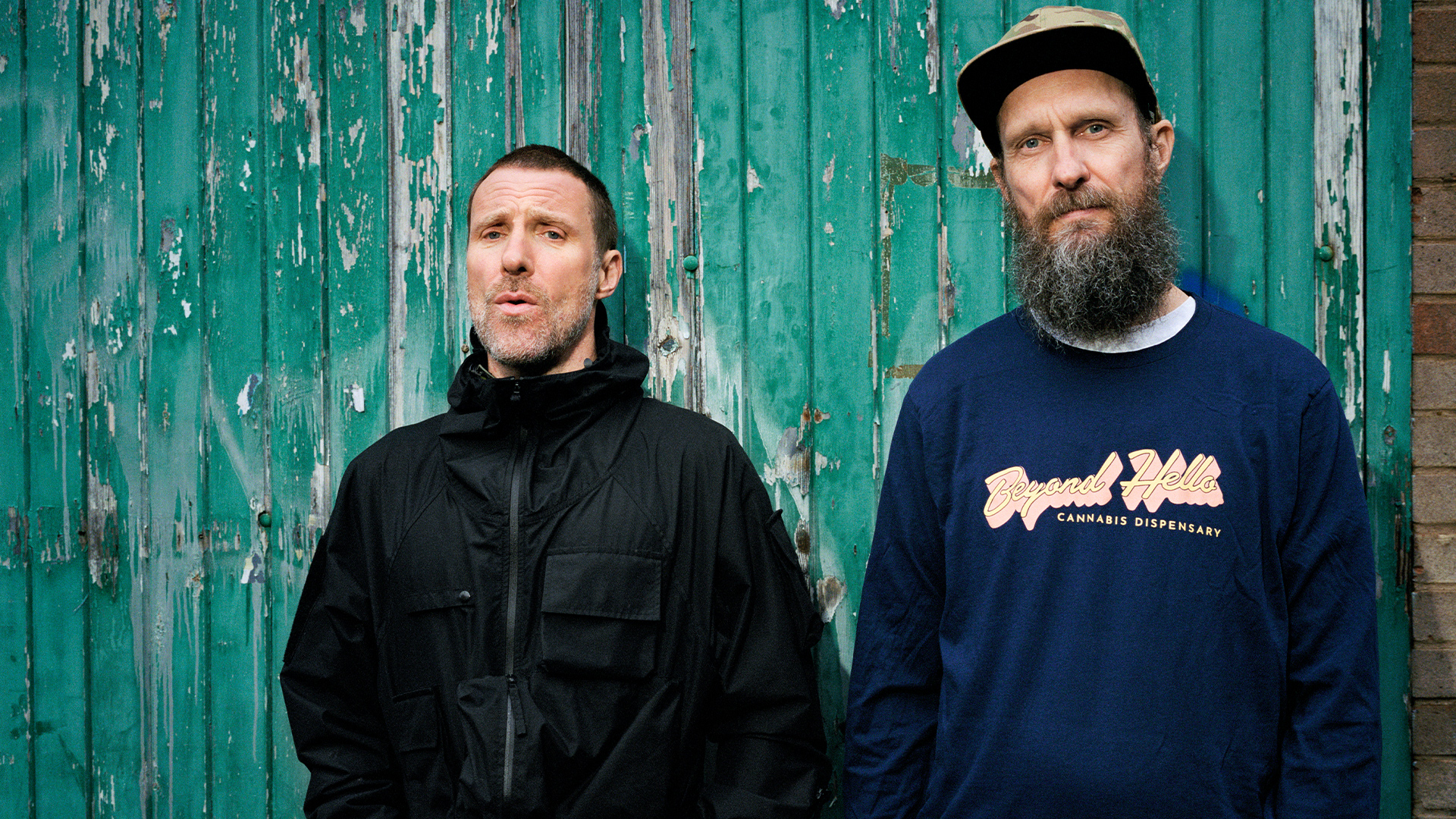
“It’s a gallery of bellends”, Jason Williamson, singer and lyricist with Nottingham electro-punk duo Sleaford Mods says of the video that accompanies the title track from their latest album, UK Grim. Created by artist Coldwar Steve (known for his surreal dystopian creations about all that’s crap in Britain), it’s a rogue’s gallery of MPs who have made politics a misery over the last decade, as well as some celebrities who have made it just a bit (more) embarrassing to be British of late.
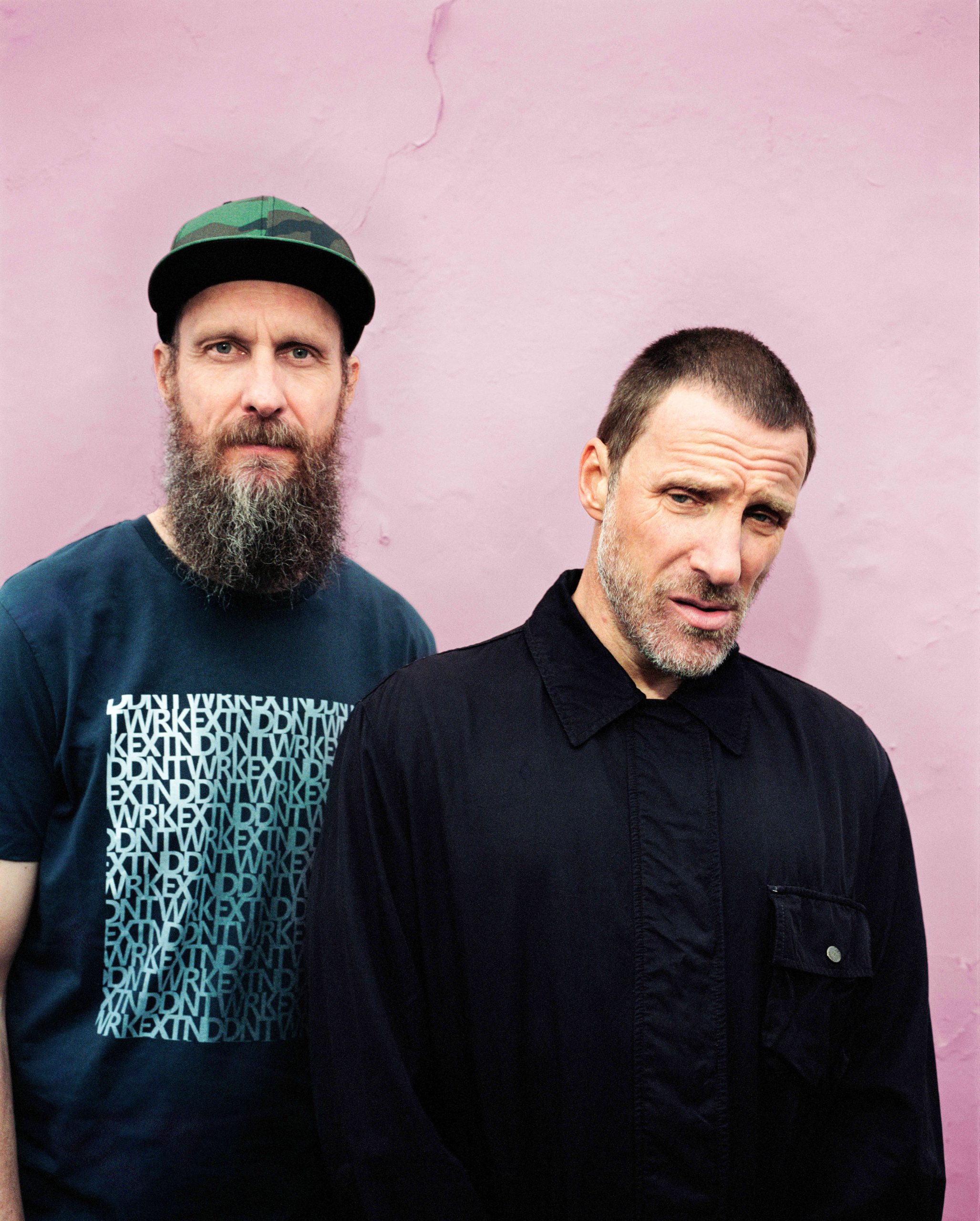
Photo: Ewen Spencer
Boris Johnson, Nigel Farage, Matt Hancock, Jacob Rees-Mogg and Liz Truss all feature, as do Jeremy Clarkson and The Who’s Roger Daltrey. I ask him who he thinks are the worst offenders. “The politicians are a given,” Williamson says. “You just know they are c**** full stop. It’s their job to be like that. But it’s people like Roger Daltrey who flew the flag for Brexit that make me sick. Ignorant and unwilling to be anything else.”
While Daltrey was an outspoken supporter of leaving Europe, Williamson and his multi-instrumentalist band mate Andrew Fearn were vehemently opposed to leaving. We meet on the day a vegetable shortage is declared in the UK, with Brexit red tape being blamed for delays in getting produce across the border. Daily Mail readers were up-in-arms, so too were people declaring “they didn’t vote for this” online. The pair laugh about how it’s taken – of all things – “a bloody tomato shortage” to make some people question why they voted for Brexit.
“Yeah, there’s no veg at the moment, so people are starting to think Brexit might have been a bad idea,” Fearn laughs from his home in Warwick, his mass of musical gear visible in the background. Williamson laughs too, the close bond between the two evident from the get-go. “I mean, it’s never happened before, has it? It’s quite a big deal. It’s a sign of what’s to come, I think. We feel like we’re an island and we believe the hype, this kind of, ‘Oh, we’re alright, we’re safe on this little island, we can survive alone’, but we can’t. The government is saying ‘we’re safe, we’re self-sufficient,’ but we’re not. It’s bullshit.”
The band have documented life under Conservative rule for the last decade across seven albums. Their breakthrough, 2013’s Austerity Dogs, scrutinised benefit-slashing policies that left over 4.6 million in poverty, while 2019’s Eton Alive questioned the empathy of those in power as the fallout from Brexit began. The band’s critically acclaimed lockdown hit, 2021’s Spare Ribs, raged at the government’s inept handling of the pandemic, while their latest looks at the cost-of-living crisis and the forgotten working classes; it’s their most scathing of the government to date.
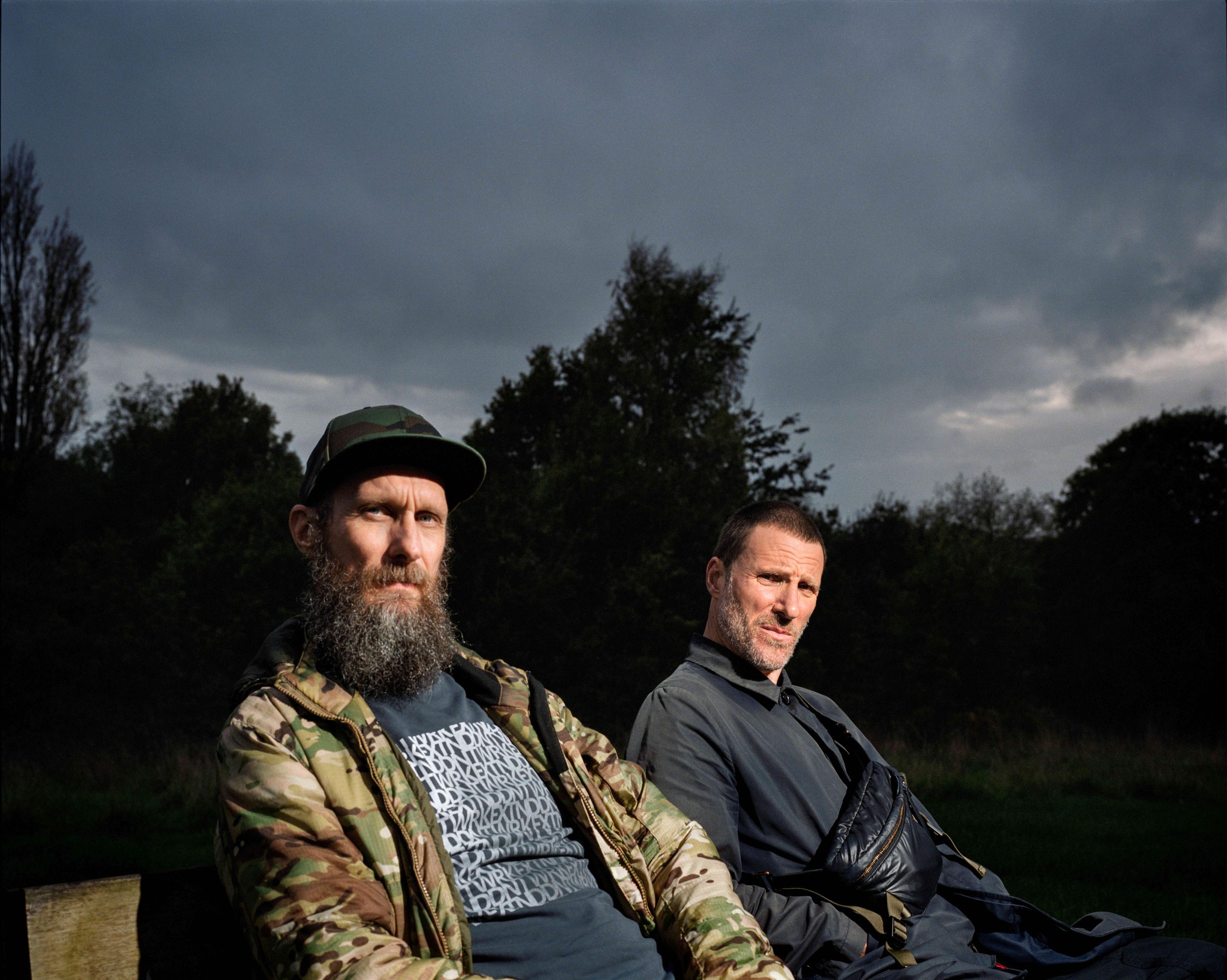
Photo: Ewen Spencer
One track, ‘Smash Em Up’, shows how people’s tolerance of each other has eroded post-Brexit and Covid. “Everybody’s getting well narky / fist fights in Sainsbury’s car park,” Williamson observes as people fall out over petty things, their patience with each other at an all-time low as differences in opinion divide. On ‘Right Wing Beast’, Williamson warns people who believe fascist rhetoric simply because it’s delivered via a polite smile. “You’re all getting mugged by the right-wing beast,” he cautions.
“There’s been so much divide and conquer over the last few years,” Williamson says from his home in Nottingham, discussing the context to the songs. “You’re getting these people that have got leftist views merging into right wing ones and it’s really weird. The nationalism in this country, well, it’s got manners, you know. It’s not quite where it’s completely brutal, like it’s not all out total fascism. It’s going through its nice manners phase where it’s got a smiling face, but there is a heavy hand there, a slapping of whatever group of people it feels is threatening… They want to disrupt what little bit of cognitive harmony we’ve got left. They want to polarise everybody.”
Their latest album was made between 2021-2022, as the UK came unsteadily out of lockdown and is a mixture of both anger and despair at what Britain has become. As well as petty fighting, Brexit divisions and the creeping rise of fascism, it’s also an observation of the abject poverty many people find themselves in during the cost-of-living crisis, where an estimated 800 million more are expected to fall into poverty this year. “In England, no one can hear you scream,” Williamson rages on the title track, saying those in poverty are being ignored by the government: “You’re just fucked, lads.”
“There’s despair beneath the album,” Williamson says. “Despair at the landscape of privileged idiots in suits. The most depressing thing currently is the homelessness for me. The scores of doomed people on the streets. It’s no life – it’s hell.”
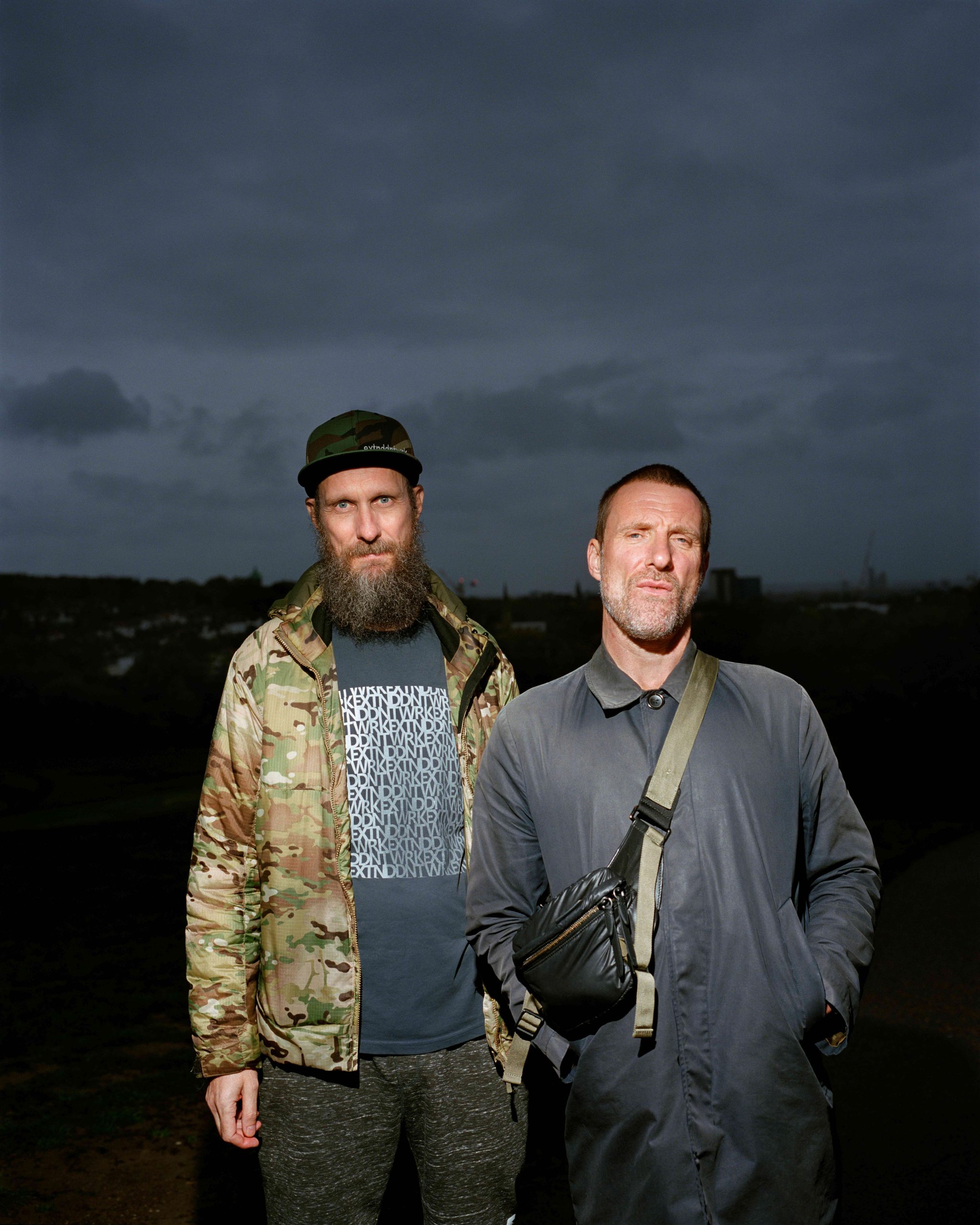
Photo: Ewen Spencer
Does he think the lack of empathy for the working classes is one of the worst things about Westminster? “One of them,” he continues. “The fact they have the monopoly on the masses is the biggest disaster. We vote for them and agree to live on the toilet seat for them. All of the time. Forever. I wouldn’t think for one minute most of them don’t understand the constraints they’ve created, but watching the film isn’t the same as being in it.”
Williamson and Fearn know exactly what it’s like to be in the film, as he puts it, with both of their working-class roots. Both struggled in low-paid jobs for years and were on- and-off the dole in-between. They worked various jobs (Fearn was a cold caller at a gym, Williamson worked in an office and a factory) while they made music in their spare time. Williamson says he took drugs and alcohol to blot out his days.
“I used drugs and drink to balance what was a very morbid existence,” he remembers. “There were pockets of joy but only on payday. Life was the pub and [getting to the] recording studio whenever I could. I gave up thinking I was going to make it very early on… I just used them [drugs and alcohol] to cope. Life was banal and fruitless.”
On ‘Pit To Pit’, a character longs for the drugs of his past but vows never to go back to it. “I’m not gonna fuck that up” he asserts firmly on the track. Was this autobiographical? A bit, says Williamson. “Sobriety completely changed my fortunes. I’m happy, with a family, a nice house and respect. I can concentrate on lots of things and produce better music now.”
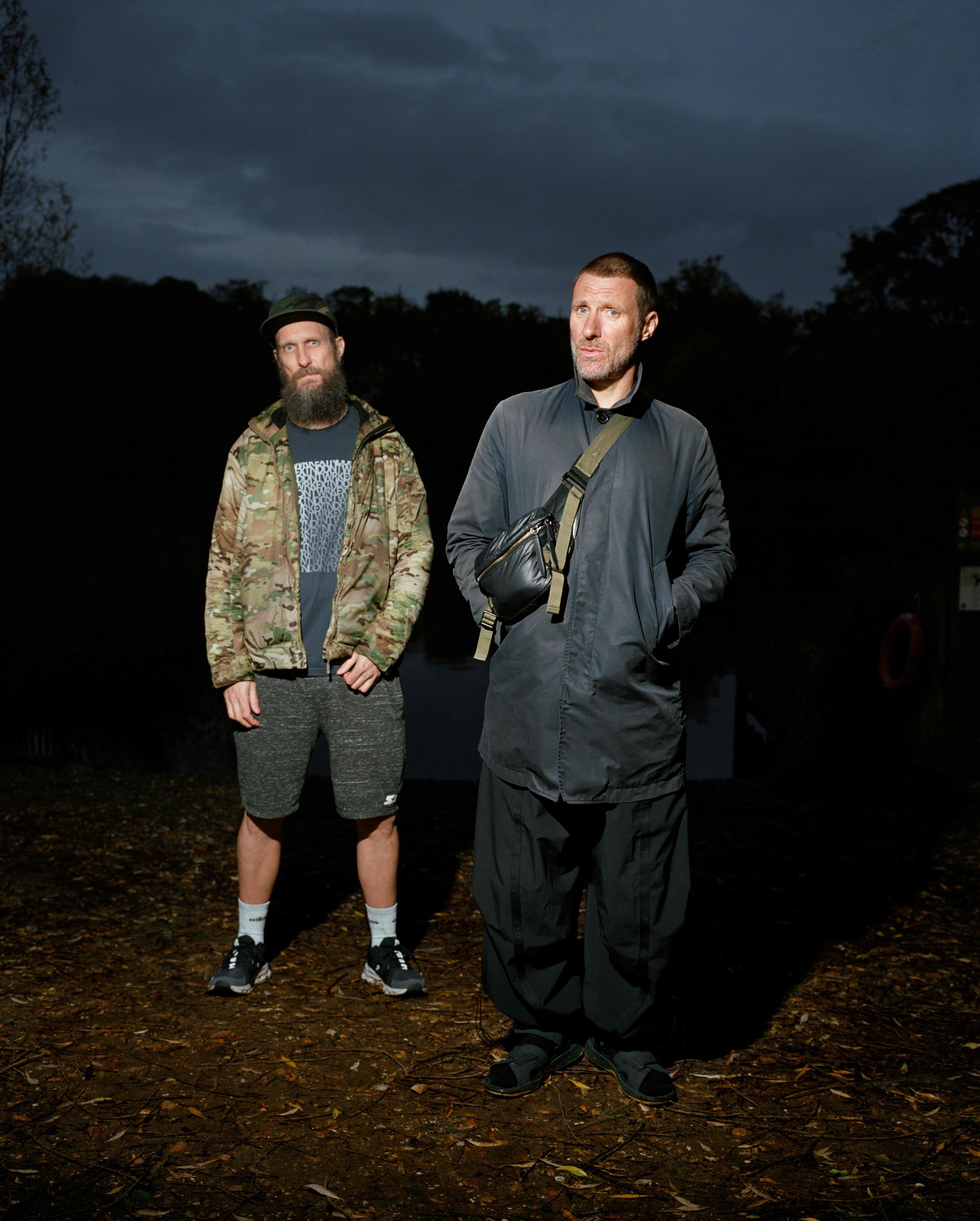
Photo: Ewen Spencer
To understand where Williamson came from is to listen to songs like ‘Apart From You’, where he paints a Ken Loach-like picture of people struggling to survive on the breadline – something he experienced growing up – then later as an adult, until success came with Sleafords. He sounds tortured by what’s going on now, to the level that it can only have come from experiencing similar.
“There’s a system and there’s you”, he says on ‘Apart From You’ in his lyrical East Midlands sprechgesang, while on ‘Tilldipper’, a man steals from his place of work to afford to have “a dinner on the table every day.” Both recall the ‘Choose Life’ speech from Trainspotting in sentiment: the futility of having dreams when you’re in a system that allows you none.
Both Williamson and Fearn grew up in the seventies and eighties under Margaret Thatcher, but they think the poverty under the current government is even more oppressive. “It’s worse in some respects,” Fearn says. Williamson agrees: “Yeah, it’s much worse now. I used to be able to get crisis loans. In the end, they wouldn’t give me any more because I kept applying for it. Now, they’ve completely shredded those away. Was it easier back then? Probably not. It was still as bleak, still as horrible.”
Williamson and Fearn say they were able to survive financially – just – but are not sure they could if they were in the same situation now, amid the cost-of-living crisis. “I mean you could get that thing on your wages, working tax credit, which gave you an extra £200 a month,” Williamson recalls. “I could manage, just about.” Fearn remembers having it too. “Yeah, it was shit, but you could live on it. I really don’t know how people are surviving now.” Williamson agrees. “Universal credit looks fucking bleak. The amount of inflation, the minimum wage. People can’t live on that.”
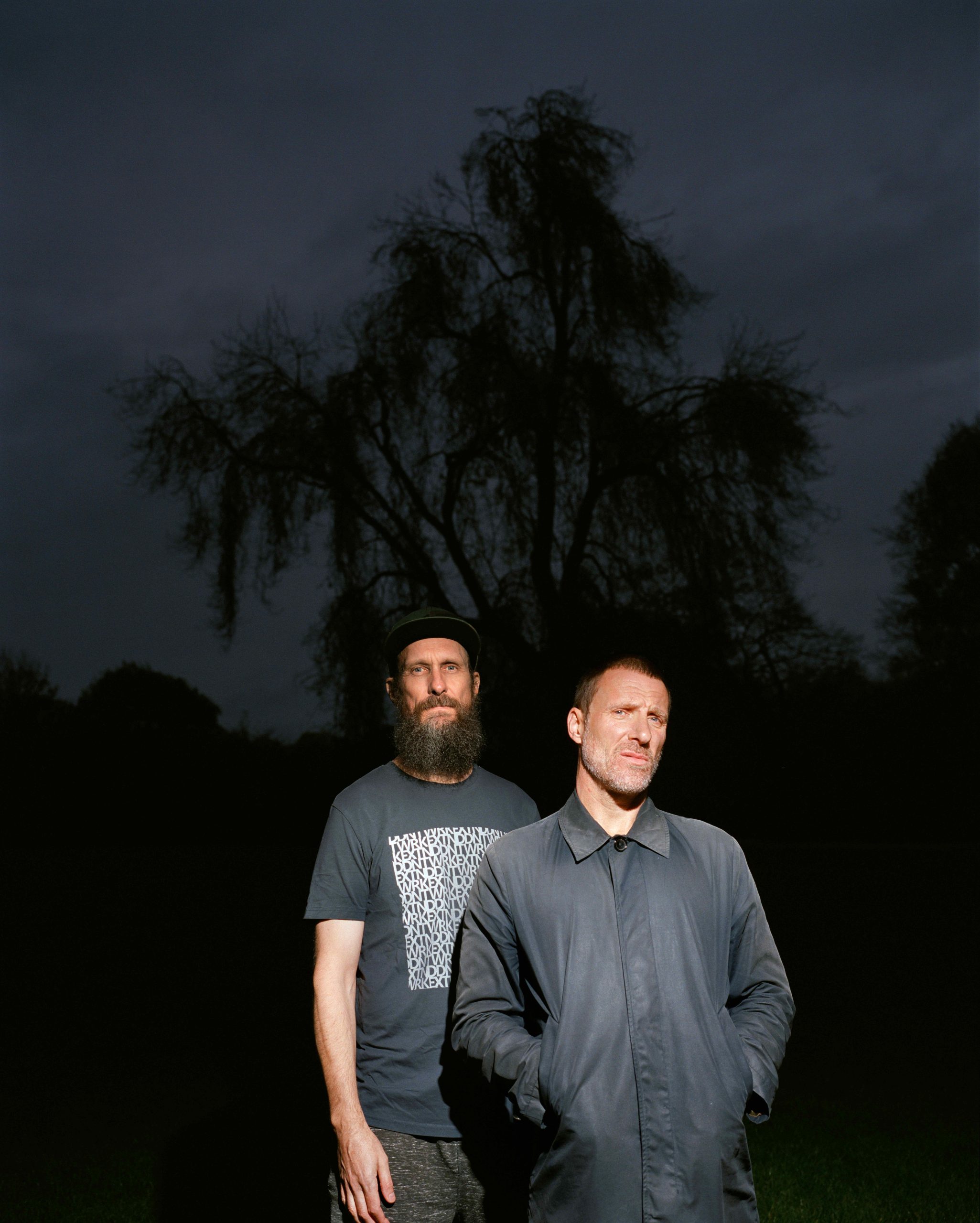
Photo: Ewen Spencer
While working in poorly paid jobs, the pair tried to make music by any means possible. Fearn says it was the only thing that kept him going. “I constantly got thrown off the dole,” he recalls. “But I was moving from part-time work to unemployment again just to have free time to make music because that was all that was important to me. Too many musicians end up with all their gear stored in a wardrobe and I thought that was going to be me. The thought of never making music just terrified me.”
Their tenacity paid off. After getting more gigs, they eventually signed to Rough Trade in 2016. Their music set them singularly apart from everything else in the charts. For one thing, they didn’t do melody: they put spoken dialectal word over minimalist electro beats, combining it with grime and elements of rap. Williamson’s delivery was part- Sex Pistols’ John Lydon, part- The Fall’s Mark E. Smith: angry, conversational, spitting, soothing, raving, ranting – often all at once. Their last album earned them their highest chart placing to-date (fourth), and their work spurred a whole new generation of artists who took Sleaford’s blueprint and made it their own (see: Dry Cleaning and Yard Act).
The pair didn’t get their breakthrough until they were well in their forties (they’re both in their early fifties now). Did they experience ageism? “Yeah, loads,” Williamson laughs. “But I can’t say anything about that. I did the same [to older artists] as a young man… youth is such an all-encompassing energy that the idea of deteriorating is just completely unacceptable,” he says laughing. “Life creeps up on you though so if anything, it’s quite funny to think that it will fuck our detractors up the same way too.”
They’ve had their fair share of arguments with their detractors along the way. A few years back, the band had a spat with post-punk band Idles – many compared it to the fights between Blur and Oasis in the nineties. Williamson now says he’s sorry for what happened. “I regret being so obsessive and slagging off Idles,” he says. “It’s not music I normally like but so what? My initial points were buried somewhere in my constant criticism of them. I don’t think it’s right to do that now. There’s a time and a place to critique. It’s taken me this long to realise that.”

Photo: Ewen Spencer
Williamson is famous for his barbed takedowns on the internet, and while he may have apologised to Idles, he’s still calling out others. On dancefloor bop ‘Trendy’, made in collaboration with Jane Addiction’s Perry Farrell and Dave Navarro, Williamson takes aim at online influencers. “Ya got ya Top Gun glasses on upside down!” Elsewhere, he’s got some choice words for “post punk dross” and the “white bloke aggro band[s]” on album standout ‘D.I.Why’. Such bands, he says, are made up of people who are nothing more than “Shouty [Fred] Dibnah’s in an All Saints jacket.”
“It’s meant to be a comment on that scene and how it regards itself to be all-encompassing and all-knowing when it’s actually just a repetitive cycle of the same old shit,” Williamson says. “That’s the reason why not a lot of them get anywhere. It’s just insular, pretentious. I’m going to get a backlash for it I know,” he continues. “But you’re going to get backlash for whatever. I mean we get fucking backlash for just carrying on.”
While they proved they can indeed carry on, and that creativity doesn’t stop at thirty, another barrier to cracking the industry came via the content of their songs by those atop the music industry. “The gatekeepers in this industry are more inclined, in my experience, after being in this industry for ten years, to go for more gentrified indie acts with the occasional tokenistic street band,” Williamson argues.
While there are many reasons why so few working-class bands are making it through right now (the cost of touring, disappearing grassroots venues, little revenue from streaming), Williamson also thinks it’s because the content of songs from working-class artists is often too painful for the industry to hear, and is at odds with much of the anodyne music put out by bigger labels in particular.
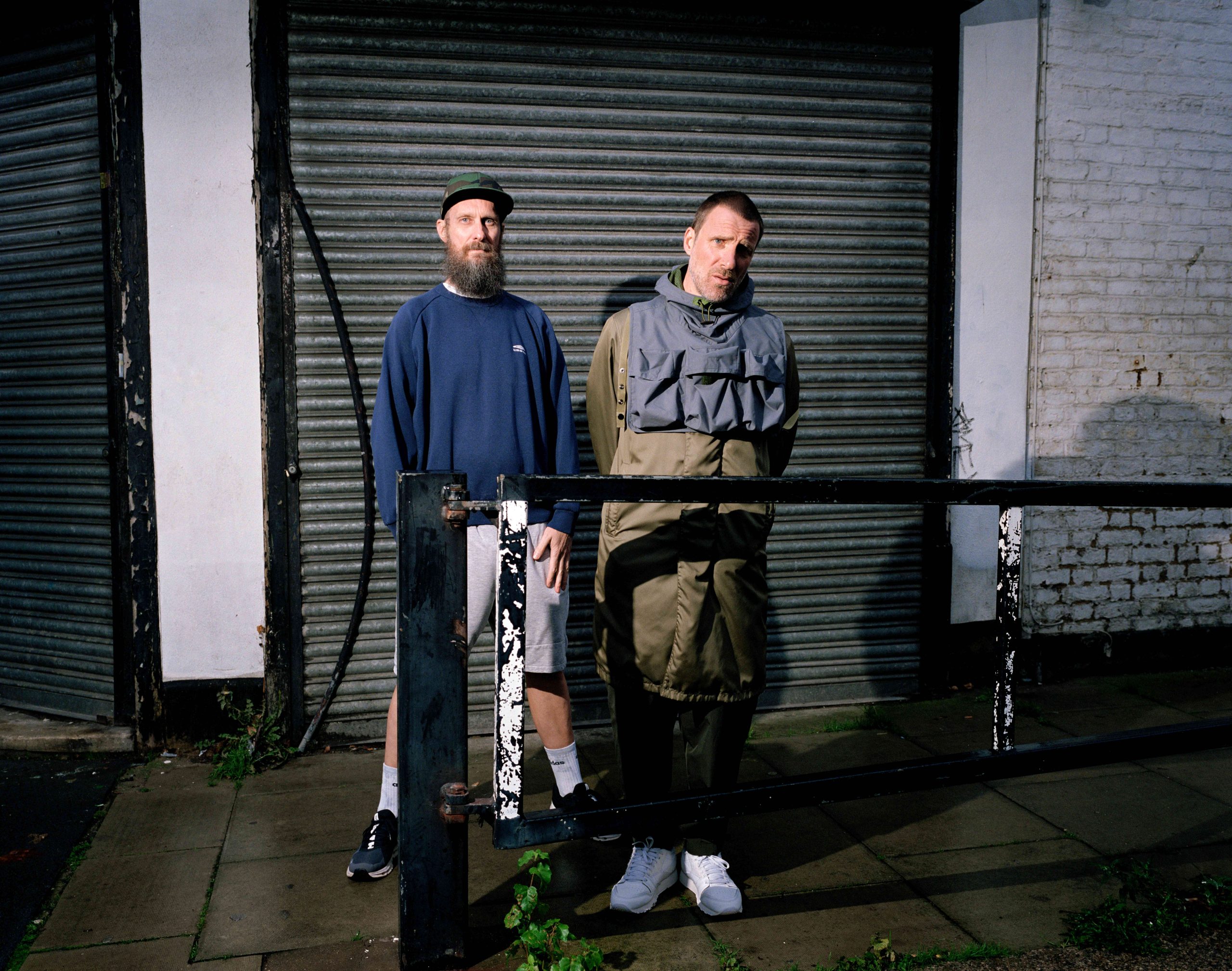
Photo: Ewen Spencer
“I think the current working-class message is so brutal, it’s not accepted,” he continues. “Some of it has been partly accepted by Radio 1, via UK rap, trap and grime; but generally, the working-class experience is too brutal for people. They don’t want to hear it.” He feels they’re “invisible” because to see the suffering inflicted upon them by decisions from Westminster is too unpleasant for some: out of sight, out of mind.
“People are lost, out of their wits,” Williamson explains. “People are trying to do something, to get somewhere. Everybody is trying to grapple for something that will get them pulled out of this terrible situation, but they can’t. It’s quite disturbing to see.
“The [government] are just horrible people and their day of reckoning will come, without trying to sound biblical or anything. But I think these people will have to face themselves for what they’ve done.”
At the next General Election, they think Labour will win. “They’ve certainly got to be better than the Conservatives, without a doubt,” Williamson says. “We lean towards socialist politics. The idea is for everybody to have a kind of equal existence but an existence where they can cope. There doesn’t seem to be that with this government.”
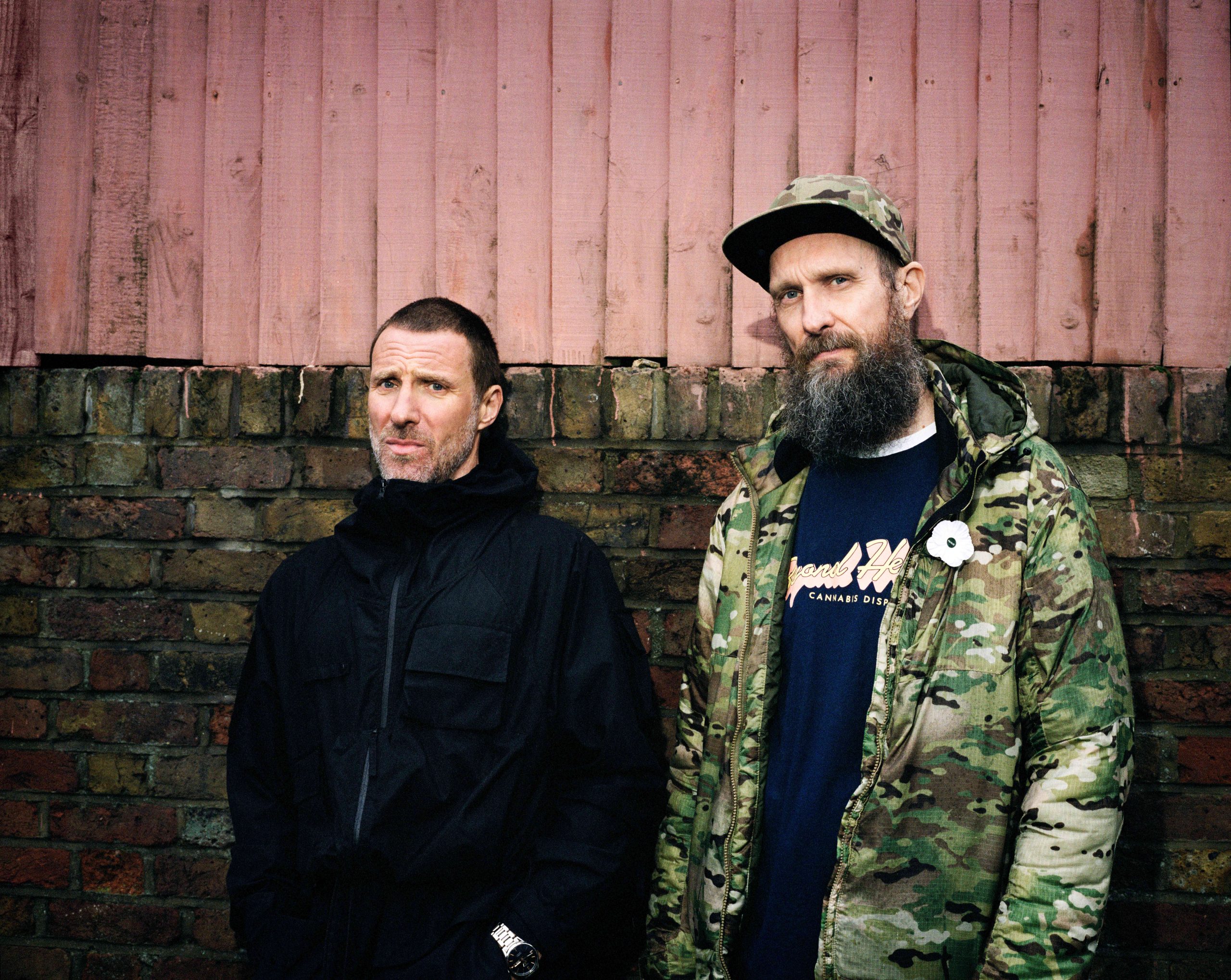
Photo: Ewen Spencer
The band say it will be “interesting to see how [their music] will continue,” once a new government are elected. “How do we expand on this political theme when we are clearly in a different position socially and status-wise, financially?” they wonder, having achieved enough success in recent years to enjoy a comfortable living compared to what they’ve ever previously experienced. “It might not carry on. It might get to a point where we’ll get sick of it.”
They’re not there yet, though, and firmly intend to carry on making music for some time yet. “But as people, we can just be a bit pissed off all the time,” Fearn continues, “so the music will be dressed, I’m sure, in some kind of comment on what’s going on around us.”
Williamson adds: “It doesn’t matter who is in power. I’ve got no qualms writing about whoever because the corruption carries on. They’re a part of the same vehicle.” What are their hopes for a new government? “More compassion and help for those that need it,” Williamson says, “in every area.”
The band take a moment to reflect on how they got here, against the odds. “We absolutely represent [hope] which is something that gets overlooked a lot of the time with us,” he continues. “We are a real fucking success story. We’re the real thing… I’m the happiest I’ve ever been I think,” Williamson smiles, as Fearn nods in agreement.




